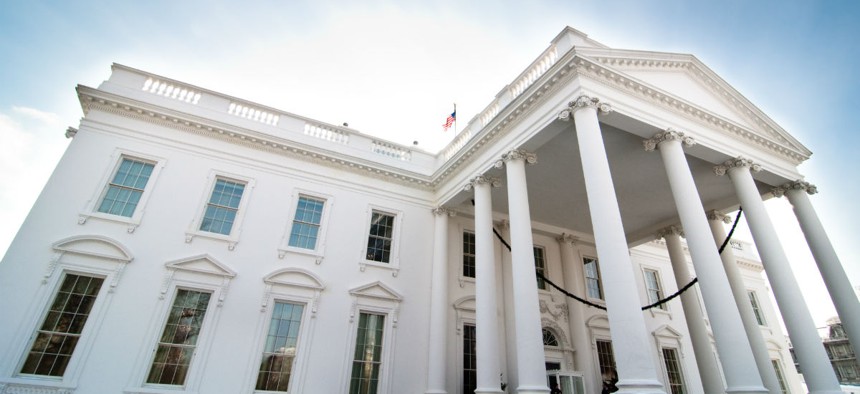White House Cracks Down on Unions with Executive Orders
President Trump issued a series of executive orders Friday that would streamline firing and could gut federal employee unions’ ability to represent workers.
President Trump issued a series of executive orders Friday that could gut federal employee unions’ ability to negotiate with agency leaders and represent workers, as well as reduce the time it takes for an agency to fire people for poor performance or misconduct.
Billed as the first step toward broad civil service reform, senior administration officials announced in a call with reporters on Friday afternoon three executive orders aimed at making it easier to fire poor performers and ordering harsher treatment of union representatives.
“Today, the president is fulfilling his promise to promote a more efficient government by reforming civil service rules,” said Andrew Bremberg, director of the president’s Domestic Policy Council. “Every year, the Federal Employee Viewpoint Survey shows that less than one third of federal employees believe poor performers are adequately addressed by their agency. These executive orders make it easier to remove poor performing employees, and ensure that taxpayer dollars are more efficiently used.”
The first order, as described by a senior administration official speaking on background, would reduce the time it takes to fire poor performers and employees suspected of misconduct by standardizing the length of Performance Improvement Plans at 30 days across government. Currently, PIPs vary from agency to agency, and generally run between 60 to 120 days.
“A GAO report shows that it takes six months to a year to remove someone from government, and can often take another nine months on appeal,” the official said. “[This] also encourages agencies to fire someone for misconduct when they’ve been engaged in behavior that warrants it, instead of just suspending them.”
Another executive order significantly curbs employees who are union representatives from using official time, a practice where the federal government compensates a worker for performing representational duties instead of their standard work. Official time recently has come under fire, both from an Office of Personnel Management report and a hearing by the House Oversight and Government Reform Committee.
The order stipulates that union officials can spend no more than 25 percent of their work hours on official time. Additionally, it stipulates that official time can no longer be used to lobby Congress or to represent employees who have filed a grievance or are appealing an adverse personnel action, and it orders agencies to charge rent for union use of federal office space and cease covering expenses for official time-related travel.
The last order directs agencies to renegotiate collective bargaining agreements with federal unions, and to ensure that process concludes within a year. It also orders OPM to develop a Labor Relations Working Group to analyze CBAs for what the administration described as “wasteful” provisions, and it requires that CBAs be published in a centralized, public database for public scrutiny.
Administration officials said they estimate the changes to labor relations policies could save “at least” $100 million in taxpayer money. When asked about potential increased costs as a result of the decrease in official time, which is often used to mitigate disputes before a grievance or civil litigation is filed, an official claimed such actions would actually decrease.
“Litigations and grievances, we expect those to be reduced quite substantially, although our cost savings estimate doesn’t factor that in,” the official said. “Once those are factored in, the savings would only be increased, not decreased.”
American Federation of Government Employees National President J. David Cox said in a statement that the executive orders are a "direct assault" on union members' legal right. "This is more than union busting—it's democracy busting," he said. "President Trump's executive orders do nothing to help federal workers do their jobs better. In fact, they do the opposite by depriving workers of their rights to address and resolve workplace issues such as sexual harassment, racial discrimination, retaliation against whistleblowers, improving workplace health and safety, enforcing reasonable accommodations for workers with disabilities, and so much more."
Rep. Gerry Connolly, D-Va., was unavailable to comment Friday, but he condemned the White House's actions on Twitter:
Trump continues his assault on the federal workforce with today's executive orders. Attacking unions and demagoguing federal workers won't help morale. Show the federal workforce that serves all Americans the respect it deserves, Mr President.
— Gerry Connolly (@GerryConnolly) May 25, 2018
But Sen. James Lankford, R-Okla., praised the move in a statement, calling it an important step toward a more effective federal government."The hallmark of the American civil service is our commitment to hire the best and the brightest to serve our fellow Americans," he said. "These executive orders strive to make the federal government more efficient, not only for the taxpayer, but for our great federal workers. We have thousands of federal employees who work very hard for the nation; it's important that their work is not frustrated by the poor performance of a small few."
In a call with reporters, AFGE officials said the union will consider all possible actions to fight the executive orders, including litigation. "My lawyers are already looking at what possible violations of the law are contained within the executive orders, and we will take action accordingly," said AFGE General Counsel David Borer. "We haven't seen the final version yet, but we're preparing our analysis and we will respond aggressively."
Tony Reardon, national president of the National Treasury Employees Union, said in a statement said the executive order is not only an assault on unions, but on "the nation's civil service laws."
"Rather than promote efficiency in the federal sector, the administration is demanding federal workers lose their ability to challenge unfair, arbitrary and discriminatory firings and other actions. This would begin the process of dismantling the merit system that governs our civil service," Reardon said.
This story has been updated.








